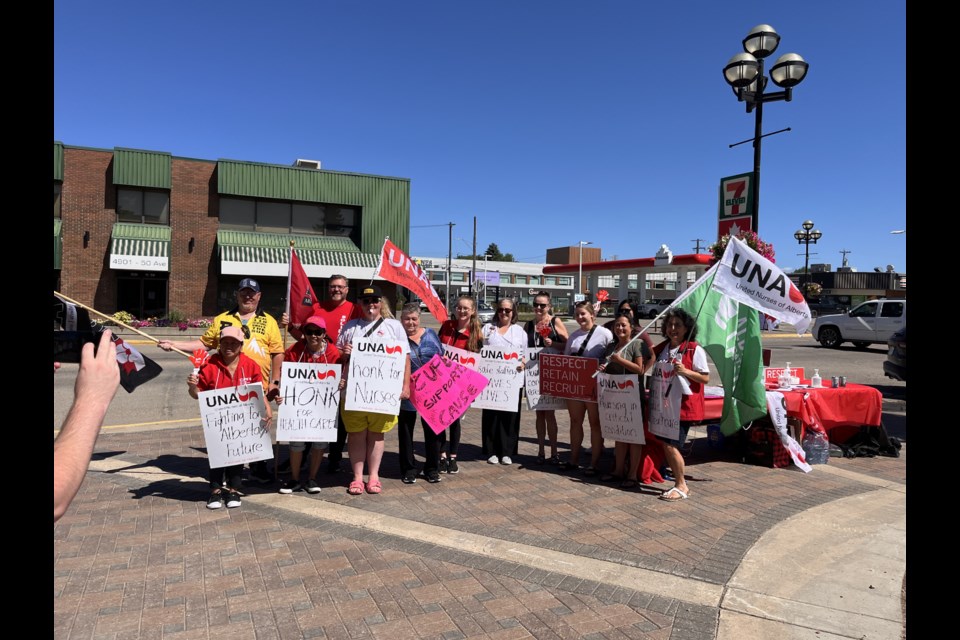BONNYVILLE – Healthcare workers congregated in front of the Bonnyville provincial building on Aug. 1, to raise awareness about the challenges Alberta healthcare workers are experiencing in their work and in their contract negotiations with the province.
The United Nurses of Alberta (UNA) organization is calling for an increase in retention, recruitment and respect in Alberta’s health care system. UNA, alongside other healthcare unions, are undergoing negotiations with the provincial government to improve the working conditions for healthcare workers.
Linne Bowler, UNA Local 114 president, is a Bonnyville registered nurse. Local 114 represents community health services and encompasses Cold Lake, Bonnyville, St. Paul, and Elk Point.
“We are here to spread awareness about what is going on in Alberta. Right now, we are in contract negotiations, and they aren't negotiating in good faith. They want to cut, cut, cut, and we’re saying no, we’re not doing this anymore – our health care is in trouble,” said Bowler.
“We’re not the top standard, and we’ve always been the top standard, and that’s the sad part,” added Bowler. “We need better conditions. Safer staffing is a constant – we need safer staffing in extended care, in the hospitals, in community health - so Albertans can have the best care. It’s all about the people we look after.”
Judy Sibley, a member of the Canadian Union of Public Employees (CUPE) working out of Extendicare, said “If we are short staffed and working conditions are poor, we are human and can only do so much. It affects us when something bad happens – we carry that emotional and mental burden.”
Ashley Rogina-Cole, UNA local 86 president, represents the registered nurses inside the Bonnyville Healthcare Centre.
“The standard of care we provide has had to decrease because of the chronic staffing and its challenging on nursing, but ultimately it's the patients who suffer,” said Rogina-Cole.
“Something that we’re seeing across the province is that the chronic staffing shortages... The continual disrespect for healthcare providers is pushing healthcare providers out of the province,” explained Rogina-Cole.
“Anyone across the healthcare spectrum is either leaving the profession altogether, leaving the province, or we’re even seeing new grads not even entering the profession. So, we’re in this chronic shortage and there needs to be something done to keep Alberta nurses in Alberta,” continued Rogina-Cole.
“The other provinces have really upped their contracts. So, now we’re losing nurses - they’re retiring because they’ve had enough, or they’re moving to different provinces because they get paid more and get more respect, and we want them to stay in Alberta,” said Bowler.
“Across the country, Alberta has the highest inflation, and our wages are not coming up. The cost of living has increased 17 per cent to 18 per cent in the last five years and our wages are not reflecting that,” said Rogina-Cole.
Temporary emergency closures have become a common occurrence in many hospitals in the Lakeland – although Bonnyville has not been affected by this as much as other sites.
“Our local community doesn't have too many emergency rooms closures, but the reason for this is because of the high-costing agency nurses. The only reason why our hospital, Bonnyville Healthcare Centre, has been able to stay open is because of these high-costing agency nurses, which are paid double what a typical staff nurse is, including travel, living allowance, meal allowance, and other benefits,” explained Rogina-Cole.
One service that is sometimes affected locally is labour and delivery.
“It’s not uncommon that pregnant patients need to go to the city, two-and-a-half hours away, for inductions, epidurals, or routine care. We want our community members to be able to receive safe and local care here,” said Rogina-Cole.
“Our solidarity here today is to create awareness that health care needs to be fixed - that it needs better working conditions. We want to protect our healthcare and ensure that negotiations are made in good faith,” said Bowler.



